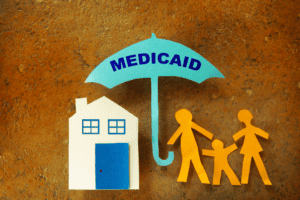Medicaid and disability
Did you know?
- Medicaid is a comprehensive program of health insurance and services, and covers many supports for people with disabilities.
- If your child has a disability they may qualify for Medicaid or other public insurance, even if the family does not meet the income guidelines. Check with your state.
Learn more: www.insurekidsnow.gov/
Many people with disabilities, both children and adults, rely on Medicaid for critical services that they would not otherwise be able to get. These include things like direct service workers (DSWs) or personal care attendants (PCA), diagnostic testing, therapy services and much more.
“Emergency Flexibilities” during the pandemic
The COVID-19 pandemic threw a huge wrench into the healthcare system. With stay-at-home orders, many people couldn’t get their services or medicines.
Medicaid responded by allowing states to reduce the red tape and adjust policies to make it easier for people to get the services they need. They call these changes “emergency flexibilities” and most will stay in place until the end of the public health emergency.
Many private insurance companies have also made similar changes!
What kind of changes did Medicaid make?
Here are some examples of how states are making it easier to access services and medicines during the pandemic:

Telehealth – phone and video appointments with doctors and therapists:
These are now covered the same way as in-person visits, and many providers who were not doing this before are doing it now.

Prescription medicine, medical equipment and supplies:
You can now get a 90-day supply instead of one month at a time.

Continuous coverage: Re-enrollment requirements are on hold so people won’t lose coverage during the pandemic.

Providers of in-home services: There are fewer restrictions now on who can do paid personal care work. Even family members can now get paid to do what home health aides would do.
Some states are also:
-
Allowing evaluations by phone or video
-
Allowing access to more services without needing prior authorization
-
Changing eligibility criteria so more people can qualify for home care
-
Adding new types of waiver services
-
Allowing some services to exceed limits or “caps”
-
Including home-delivered meals for some waiver recipients
-
Providing technology and assistance needed to access telehealth
“Where has this been all my life?!”
This is what many families are saying about these new policies. And state Medicaid offices are listening! They are exploring ways to extend these policies beyond the pandemic because they have been so successful at providing needed care with less fuss!
Many of these changes will likely continue through 2021, especially the telehealth options, but end-dates may be different in each state. The great news is that some of them may even become permanent, depending on where you live!
To find out the latest on Medicaid policies, or to ask any questions about Medicaid, contact your State Medicaid Office.
Ask about any new policies that are in place since the pandemic that may help your family.
See these Guides to learn more about health insurance, Medicaid, eligibility, and disability benefits:




